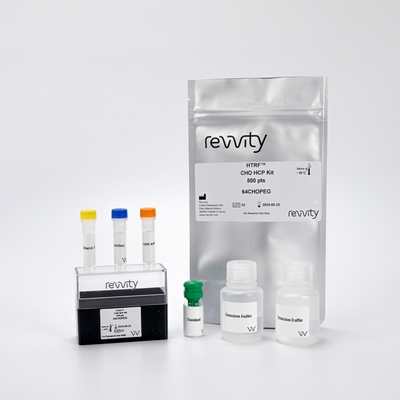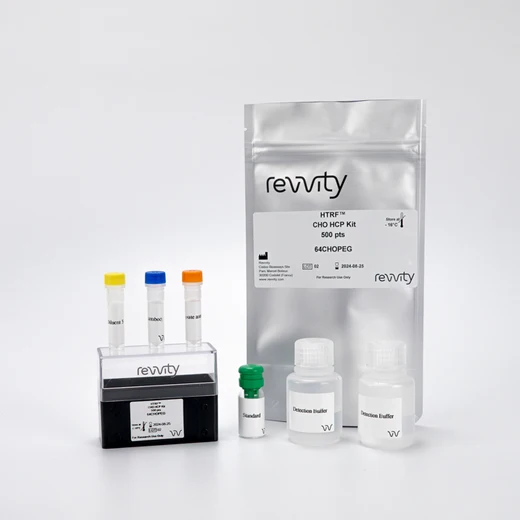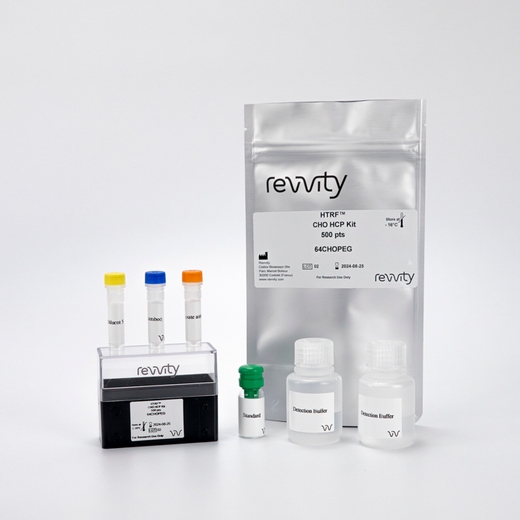

HTRF CHO Host Cell Protein Detection Kit, 500 Assay Points


HTRF CHO Host Cell Protein Detection Kit, 500 Assay Points






The CHO Host Cell Protein kit is designed for the quantitative assessment of Chinese Hamster Ovary (CHO) cell contaminants in bioprocess operations.
For research use only. Not for use in diagnostic procedures. All products to be used in accordance with applicable laws and regulations including without limitation, consumption and disposal requirements under European REACH regulations (EC 1907/2006).
| Feature | Specification |
|---|---|
| Application | Protein Quantification |
| Sample Volume | 16 µL |
The CHO Host Cell Protein kit is designed for the quantitative assessment of Chinese Hamster Ovary (CHO) cell contaminants in bioprocess operations.
For research use only. Not for use in diagnostic procedures. All products to be used in accordance with applicable laws and regulations including without limitation, consumption and disposal requirements under European REACH regulations (EC 1907/2006).



HTRF CHO Host Cell Protein Detection Kit, 500 Assay Points



HTRF CHO Host Cell Protein Detection Kit, 500 Assay Points



Product information
Overview
The CHO Host Cell Protein (HCP) kit measures contaminants originating from the CHO cells used to manufacture therapeutic antibodies. The kit can be used for the quantification of CHO HCP proteins in routine bioprocess operations, from the completely raw harvest material to the final product. The simple and robust procedure benefits from increased throughput compared to ELISA.
Specifications
| Application |
Protein Quantification
|
|---|---|
| Automation Compatible |
Yes
|
| Brand |
HTRF
|
| Detection Modality |
HTRF
|
| Product Group |
Kit
|
| Sample Volume |
16 µL
|
| Shipping Conditions |
Shipped in Dry Ice
|
| Target Class |
Biomarkers
|
| Technology |
TR-FRET
|
| Therapeutic Area |
Cardiovascular
Infectious Diseases
Metabolism/Diabetes
NASH/Fibrosis
Neuroscience
Rare Diseases
|
| Unit Size |
500 Assay Points
|
Video gallery

HTRF CHO Host Cell Protein Detection Kit, 500 Assay Points

HTRF CHO Host Cell Protein Detection Kit, 500 Assay Points

How it works
Assay principle
The CHO Host Cell Protein (HCP) assay is a sandwich immunoassay. The assay uses a specific and qualified anti-CHO HCP polyclonal antibody pool, labelled with Eu3+-Cryptate and t d2. The specific signal is proportional to the concentration of CHO HCP present in the sample. This homogeneous assay requires only a single reagent addition (by premixing the detection reagents), and an overnight incubation, for the quantitative detection of CHO HCP.

Assay protocol
The CHO HCP assay protocol, using a 384-well small volume white plate, is described on the right. 16 µL of sample or standard are dispensed directly into the detection plate for detection by HTRF® reagents. The antibodies labeled with the HTRF donor and acceptor can be pre-mixed and added in a single dispensing step, to further streamline the assay procedure. This protocol requires only 1 overnight incubation period.

Assay details
HTRF CHO HCP assay specifications
| Sample volume | 16 µL |
|---|---|
| Final assay volume | 20 µL |
| Time to results | Overnight at RT |
| Detection limit | 0.8 ng/mL |
| Dynamic range | 3.6 to 400 ng/mL |
| Sample compatibility | From raw harvest material to the final biotherapeutic product |

HTRF CHO HCP assay specifications

Analytical performance
Precision
Intra-assay (n=24)
| Sample | Mean [CHO HCP] (ng/mL) | % CV |
|---|---|---|
| 1 | 10 | 6% |
| 2 | 29 | 3% |
| 3 | 97 | 3% |
| 4 | 306 | 4% |
|
Each of the 4 samples was measured 24 times, and the %CV on concentration was calculated for each sample. |
||
Inter-assay (n=4)
| Sample | Mean [CHO HCP] (ng/mL) | %CV |
|---|---|---|
| 1 | 10 | 9% |
| 2 | 29 | 5% |
| 3 | 97 | 4% |
| 4 | 292 | 5% |
|
Each of the 4 samples was measured in 4 independent experiments by 4 different operators, and the concentration % CV was calculated for each sample. |
||
Antigen spike and recovery
| Sample | [CHO HCP Standard] (ng/mL) | [CHO-DG44 HCP Sample] added (ng/mL) | Expected [CHO HCP] (ng/mL) | Measured [CHO HCP] (ng/mL) | % Antigen recovery |
|---|---|---|---|---|---|
| 1 | 13.51 | 7.04 | 20.55 | 21.38 | 104% |
| 2 | 13.51 | 14.07 | 27.58 | 27.92 | 101% |
| 3 | 13.51 | 23.38 | 36.89 | 41.25 | 112% |
| 4 | 45.55 | 26.04 | 71.59 | 69.45 | 97% |
| 5 | 45.55 | 45.06 | 90.61 | 94.08 | 104% |
| 6 | 45.55 | 88.02 | 133.57 | 137.62 | 103% |
| 7 | 95.11 | 45.06 | 140.17 | 150.64 | 107% |
| 8 |
95.11
|
88.02 | 183.13 | 202.40 | 111% |
| 9 | 95.11 | 161.56 | 256.67 | 279.14 | 109% |
Three different levels of CHO HCP Standard were independently mixed with three different sample concentrations (cell culture supernatant from a biomanufacturing process using the CHO-DG44 cell line). The total measured concentrations were compared to the theoretical ones, and expressed as % Antigen recovery (acceptance criteria: 85-115%).
|
CHO-S HCP sample |
|||
|---|---|---|---|
| Dilution Factor | Expected [CHO HCP] (ng/mL) | Measured [CHO HCP] (ng/mL) | % Recovery |
| Neat | 426 | 426 | 100% |
| 2 | 213 | 226 | 106% |
| 4 | 106 | 111 | 104% |
| 8 | 53 | 57 | 106% |
| 16 | 27 | 28 | 107% |
| 32 | 13 | 13 | 98% |
| 64 | 7 | 7 | 101% |
| 128 | 3 | 4 | 106% |
|
Samples were from cell culture supernatant from a biomanufacturing process using the CHO-S cell line diluted in the kit's Diluent 5. The recovery % obtained from these experiments show the good dilutional linearity of the assay (dilution test acceptance criteria: 80-120%) |
|||
|
CHO-K1 HCP sample |
|||
|---|---|---|---|
| Dilution Factor | Expected [CHO HCP] (ng/mL) | Measured [CHO HCP] (ng/mL) | % Recovery |
| Neat | 344 | 344 | 100% |
| 2 | 172 | 173 | 100% |
| 4 | 86 | 88 | 102% |
| 8 | 43 | 45 | 105% |
| 16 | 22 | 24 | 111% |
| 32 | 11 | 13 | 119% |
|
Samples were from cell culture supernatant from a biomanufacturing process using the CHO-K1 cell line and diluted in the kit's Diluent #5. The recovery % obtained from these experiments show the good dilutional linearity of the assay (dilution test acceptance criteria: 80-120%) |
|||
Resources
Are you looking for resources, click on the resource type to explore further.
In the dynamic landscape of pharmaceuticals, biotherapeutics research stands out as the fastest-growing sector. Scientists...


How can we help you?
We are here to answer your questions.






























